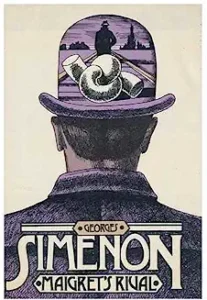Maigret’s Rival by Georges Simenon 1943
Jules Maigret, Superintendant Inspector with the Police Judiciare in Paris, is once again in the French countryside trying to solve a mysterious death. Albert Retailleau, a 19 year old living in Saint Aubin, a small coastal village, is found dead on the train tracks. An accident? a suicide? a murder? Maigret enters the scene at the request of the Examining Magistrate in Paris, his boss, who asks him to travel to Saint Aubin to put to rest rumors that his brother-in-law was involved in Albert’s death.
Our stolid, grim, but always curious detective in this 26th Maigret novel finds himself in the provinces where a wall of silence and denial confronts him along with a former colleague who Maigret had fired and who is also in Saint Aubin as a private investigator. Through the usual techniques of questioning, listening, thinking, and finally concluding, Maigret sorts out the sordid story of Albert’s murder, and as is often the case, returns to Paris without taking any official action knowing that his work has, without the formal judicial intervention, set the world more solidly on its foundation of good triumphing over evil.
The Maigret stories are not really mysteries in the classic sense but more about Maigret, his brooding insightful presence brought to bear in interesting ways and settings. This is a good one.



